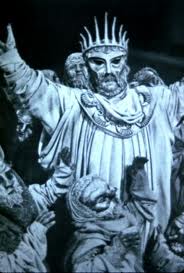- He must be a person of some stature or high position such as a king, general, or nobleman.

- He must be a good person. He must matter to us and we must see him as a worthwhile person.
- Because of his position, his actions usually have far-reaching effects.
- He must possess a character trait or quality which under normal circumstances would be a virtue, but under the special circumstances of the play proves to be a fatal flaw (hamartia- the tragic flaw that leads to his downfall).
- He usually makes further errors in judgment following his misdeed.
- Often he has a distorted perception of or is blind to, reality.
- He suffers both outwardly (isolation, alienation, attacks) and inwardly (tortured conscience).
- He must elicit both pity and fear from the audience (catharsis).
- Usually, he recognizes his mistakes in the end.
- He must die
Characteristics of a Shakespearean Tragic Hero (From Aristotle)
You are here:
- Home
- Law & Politics
- Characteristics of a Shakespearean Tragic…

Othello, the main character of play Othello by William Shakespeare can be considered a true tragic hero. As he confirms to all qualities of traflgic hero as well as having the tragic flaw which ultimately leads to his downfall.
The character which i think fits all these traits is Macbeth; he has his tragic flaw of ambition, suffers both outwardly with his whole country turning against him, and inwardly with his tortured conscience – ‘o ful of scorpions is my mind’
Macbeth doesn’t die
Yes, he does; Macduff decapitates him at the end of the play.
A tragic hero from Shakespeare would be Julius ceaser
II would disagree. I would say Brutus is the Tragic hero, not Caesar. Remember the tragic hero is the main character and he dies at the end, not in the middle. Also, something that wasn’t mentioned is that often the Tragic hero, at least in Shakespeare, takes his own life at the very end.
Brutus is more fittingg
Could you give some character examples and each of their flaws?